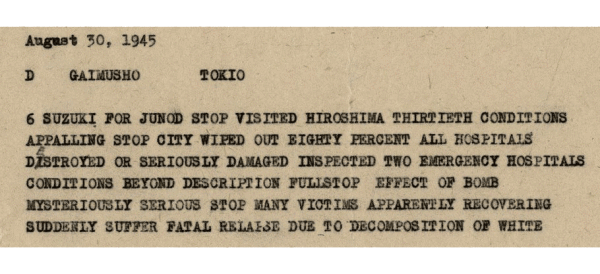Ahead of the international conference on the humanitarian impact of nuclear weapons that will take place in Oslo on 4-5 March, the International Committee of the Red Cross (ICRC) is stressing the lack of capacity at the international level to provide appropriate humanitarian assistance to survivors in the event of a nuclear explosion.
The conference, to which States, international organizations and non-governmental organizations are invited, is a unique opportunity to reiterate the dreadful consequences of any use of these weapons.
“The sheer number of people likely to be in need of help would be enormous. The challenges involved in bringing relief to survivors in the aftermath of a nuclear explosion would be immense,” said ICRC President Peter Maurer. “To name only a few, humanitarian agencies would need to organize the triage, treatment and possible decontamination of very large numbers of injured victims, many of them severely burned, and their transfer out of affected areas. There would also be significant concerns about the safety of those providing assistance and the risk associated with their exposure to ionizing radiation.”
These points were raised in a study of the ICRC’s capacity, and that of other agencies, to assist victims of nuclear, radiological, biological and chemical weapons. The study concluded that it is highly unlikely that the massive investments required to expand the capability to provide effective relief would ever be made and, if they nevertheless were made, they would likely remain inadequate. This finding should not, however, discourage efforts to meet the challenges and to be in a position to provide as much assistance as possible.
“Our organization observed the effects of a nuclear explosion in the aftermath of the Hiroshima bombing in 1945,” said Mr Maurer. “Today, we are again calling on all States, irrespective of whether they consider nuclear weapons to be lawful or not, to ensure that these devices are never used, to take measures to limit the risk of proliferation and to pursue negotiations on a complete ban on and elimination of nuclear weapons.”
The ICRC warmly welcomes the Norwegian government’s initiative to convene the conference. Although the possible use of nuclear weapons has been debated in military, technical and geopolitical terms for decades, States have never before come together to address the consequences in humanitarian terms.
The ICRC delegation to the conference will include Mr Maurer, who will address the opening session on 4 March. The following day, Gregor Malich, head of the ICRC’s nuclear, radiological, biological and chemical response unit, will make a statement.






